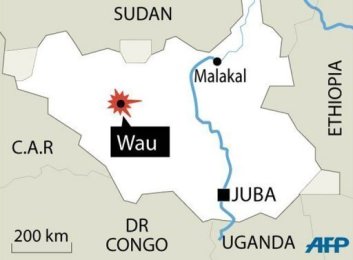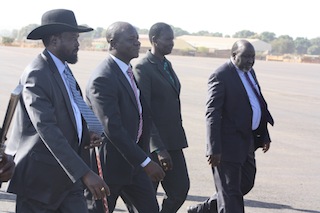WBEG: Balanda community condemns Farajalah killings, accepts Wau County transfer
January 5, 2013 (WAU) – South Sudan’s Balanda community in Western Bahr el Ghazal State on Friday denounced last month’s killing of 26 innocent civilians in the Farrajallah area of troubled Wau County and have accepted the transfer of the area’s headquarters out of Wau town.
 In a press release on 4 January, the Balanda Community Association, urged authorities to conduct investigations to establish the facts of the incident and bring the perpetrators to justice.
In a press release on 4 January, the Balanda Community Association, urged authorities to conduct investigations to establish the facts of the incident and bring the perpetrators to justice.
According to the press release: “The Balanda community deeply regrets [the] crime committed by the clique of criminals”, which took place in the Farrajallah Boma [sub-district] of Bagari payam [district] some 48 miles outside Wau town.
The 26 migrant workers, from the Dinka ethnic group, were killed in December in the midst of protests in Wau, the capital of Western Bahr el Ghazal State, over the cabinet’s decision to move the headquarters of Wau County to Bagari, which is home to the Balanda community.
The statement welcomes the government’s decision to relocate the administrative headquarters, which has been supported by South Sudan’s President Salva Kiir, who visited Wau on December 24, to express his backing for Western Bahr el Ghazal’s Governor, Rizik Zachariah Hassan.
“We welcome [the] position of our president Salva Kiir Mayardit on the question about relocation of the Wau county headquarters. His decision is final and acceptable. Actually our concern was that we needed education and awareness”, the press release adds.
Those who protested against the administrative shift, were predominantly members of the Balanda tribe – also known as Fartit. Footage passed on to Al Jazeera, appears to show the police shooting at the protestors in Wau on 9 December.
The numbers of protestors killed varies greatly between different sources, with the Governor initially denying that anyone was killed in the incidents.
However the Western Bahr el Ghazal minister of information has admitted that eight people were killed in the December 8 and 9 protests. The United Nations Mission in South Sudan (UNMISS) put the number killed at ten before revising it down to nine, while former Wau county commissioner, John Peter Miskin, has repeatedly claimed that 25 protesters were killed with 21 others sustaining injuries. Miskin stepped down in protest against the move.
Another protest broke out on Tuesday December 18 and again authorities gave conflicting figures of those killed and wounded.
South Sudan’s deputy minister of interior, Salva Mathok Gengdit, said he received reports indicating that seven lives were lost and 32 others were wounded in the second wave of protests. But a police officer at scene said 12 lives were lost, figures which medical doctors at Wau teaching hospital were able to confirm.
The killings in Farajallah village, some 48 miles from Wau town, claimed the lives of 26 innocent people, all members of Dinka ethnic group from the three different states of the country’s greater region of Bahr el Ghazal.

On New Year’s Day, leaders from Western Bahr el Ghazal, including the paramount chief of the Balanda tribe called for unity and for people to denounce the culture of violence that led to the killing of protestors and ethnic violence.
Balanda Chief Angelo Bagari said: “The development and progress of this country depends entirely on our resolve to work together. It means our unity and responsibility. Our diversity should not be seen and used as our weakness. It should be our strength.”
The motive for the Farajallah killings remains unclear, although authorities arrested a number of people, including traditional leaders from the area who were suspected to have knowingly not intervened to prevent the deaths.
Chief Bagari, who has the same name as the Bagari locality, which is the proposed location for the new headquarters of Wau County, was briefly called in for questioning by Western Bahr le Ghazal’s security services after the Farajallah killings as the area falls under his jurisdiction.
Responding to this allegation, the Balanda Community Association’s press release said: “The crime was not our collective decision as community, neither was it our intention […] The killing is inhumane and as community, we will never support such act, let the culprits be brought to justice.”
(ST)

